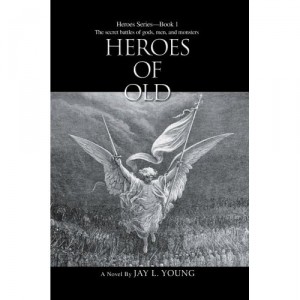
Heroes of Old by Jay L. Young, a Review
Book 1 of the Heroes Series
Self-published through i-Universe, 2007. 187 pages.
Worldview: Christian. Good vs. evil with redemption themes.
Caution: Graphic violence described. Sexual misdeeds are mentioned (not described).
This king-sized tale has been described as “X-Men Meets the Bible.”
Here’s the gist of the story: Peleg, a few generations removed from Noah, is still alive in our era. Across the millennia he has, over and over again, assembled a group of seven heroes with super powers, gifts from the Lord. Their assignment is to oppose the Nephilim, or giants, which are briefly referred to in Genesis. Young has answered the question, “Who are the Nephilim?”
Two parallel stories are told: one of the origins of the evil Nephilim, and the other of a modern Christian teenager named Noah, who discovers he has special powers (actually gifts). Peleg recruits him for the Faction, which sounds very much like the X-Men. Young Noah learns that he will have a key role to play in the struggle with the Nephilim–he is mentioned by name in an ancient prophecy.
Because of the self-publishing, this story has an unfinished quality to it–mainly some consistent spelling errors. It would benefit from editing. (I would suggest avoiding Peleg’s first person narration–it spoils the suspense.)
It is a lively, well-told, memorable story that will appeal to my 16-year-old boys, I am sure. In fact, I think it would work best in another medium–as a movie and/or a graphic novel. I can see it becoming quite popular. I hope Young pushes harder for a wider audience.
In fact this book is doing pretty well on Amazon (very well for a self-published book) and is getting favorable mentions by fans on the Internet. But it is only available on the Internet, and so would-be fans like my sons have been missing out. —Phyllis Wheeler
If you would like to buy this book, consider buying it here to help pay the costs of this blog.
